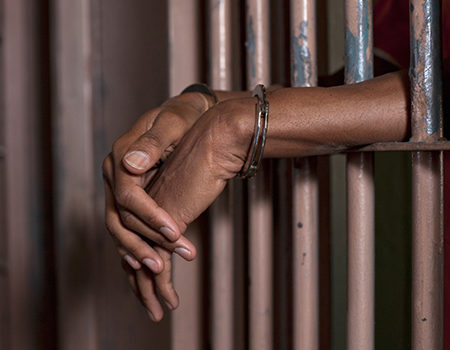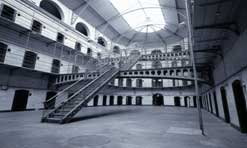Seven years ago, I had the privilege of “trailing” Catholic Chaplain Sr. Elizabeth O’Keeffe RSCJ in a three thousand person men’s facility and learned first hand that prison ministry is truly a ministry of presence. (It was a bit scary to wear a bullet proof jacket going into the “lock down” but I’ve never had to do that since!)

There is little doubt that the United States is a locked up society and a new report by Pew Center on the State’s Public Safety Performance Project details how, for the first time in history, more than one in every one hundred adults in America is in jail or prison. The Diocese of San Bernardino in Southern California is home to 32 prisons/jails. Prison spending is up, and the national recidivism rate remains virtually unchanged, with about half of released inmates returning to jail or prison within three years.
The Bishops of the United States issued a wonderful Pastoral Letter in 2000 which became the blueprint for our Diocesan Ministry. Of the 32 prisons 7 had Catholic Chaplains and these became my mentors as we began to gather and train volunteers to minister in the facilities.
The Pastoral Letter – ‘Responsibility, Rehabilitation and Restoration – A Catholic Perspective on Crime and Criminal Justice’ examined every aspect of the justice system offering guidance in areas that needed attention.
It asked the following two questions:
• How can we restore our respect for law and life?
• How can we protect and rebuild communities, confront crime without vengeance, and defend life without taking life?
These questions lead us to recognise the need to restore a sense of civility and responsibility to everyday life, to promote crime prevention and genuine rehabilitation. We began by training volunteers to bring the message of Gospel hope to the incarcerated men and women, we train people to be mentors to those leaving prison and we support families of the incarcerated by providing buses for those whose loved ones are incarcerated miles form home. Needless to mention, we do not do this alone. Collaborating with many groups, churches and the administration in prisons helps along the way.
As we reflect on the ministry, the question of awareness and consciousness raising becomes a critical part. We hold an annual Restorative Justice Conference which tries to bring together law enforcement people, district attorneys, judges, victims of crime, other church volunteers as well as families. The experiences shared are both enlightening and beneficial. Statistics show that poverty, leading to poor defense at trial, is a major factor contributing to the high numbers of African and Hispanic Americans in prison. Prison inmates have high rates of substance abuse, illiteracy and mental illness. (The largest mental facility in the state of California is Men’s Central Jail in Los Angeles).

These past few years, I learned that the gift of presence is a blessing from God. When we are present to the poor they teach us to really understand our call. I’ve learned that we need to cherish children. (A horrible statistic here in California is that when state planners are figuring out how many prisons the state will need, they look to who is failing in Third Grade). Anything we can do to help children get a good start in life is something to treasure. It is heart breaking to see the children in Juvenile Hall. Laura, one of our volunteers wondered why the girls and boys there prayed they would not go AWAL (absent without leave) from placement. It means that their home situation is so terrible the young person cannot go home and therefore is placed in a group home. Our society’s impoverished, drug ridden, violent neighborhoods are the source of our bloated criminal justice system.
Another painful learning has been my association with victims of violent crime. Rose, a woman whose lovely 20 year old daughter was the unintended victim of gang gunfire, has been a wonderful collaborator in helping victims of violence. From her devastating experience in the loss of her daughter, she has founded a group called Family and Friends of Murdered Victims. Attending their monthly meetings has been one of my saddest experiences but also the greatest experience of hope and resurrection. This group always welcomes and walks with new grieving families. The group has helped us gather for an annual Mass for victims celebrated by one of our Bishops.
May we never forget the needs of the poor in our conversations with the hundreds of groups we associate with. My greatest learning these past few years? Awareness precedes action and there are wonderful people out there who will help in the work of Mercy.
Carmel Crimmins rsm
US Community


